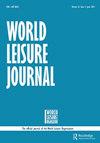Trazas del colonialismo intelectual en los estudios de ocio y recreación en Latinoamérica
IF 2
Q3 HOSPITALITY, LEISURE, SPORT & TOURISM
引用次数: 0
Abstract
RESUMENEl presente trabajo reporta la manifestación de signos de colonialismo intelectual en el campo de estudios del ocio y la recreación en América Latina. Entre estas se reconocen el racismo epistémico, la soberbia epistémica, indefinición epistémica, incongruencia epistémica, dependencia epistémica, subordinación epistémica, provincianismo epistémico y la incomprensión de la tensión histórico-epistémica. La superación de estas trazas colonialistas parte, en primer lugar, del reconocimiento que como comunidad multidimensional del conocimiento en la región podemos hacer. A posteriori, convendrá seguir proponiendo en la línea de debate propositivo, aun en los más relevantes foros y espacios de la sociedad del conocimiento.ABSTRACTThe present work reports the manifestation of signs of intellectual colonialism in the field of leisure and recreation studies in Latin America. Among these, epistemic racism, epistemic arrogance, epistemic indefiniteness, epistemic incongruity, epistemic dependence, epistemic subordination, epistemic provincialism, and the lack of understanding of historical-epistemic tension are recognised. Overcoming these colonial traces begins, first, with the recognition that, as a multidimensional knowledge community in the region, we can make. Consequently, it would be advisable to persist in proposing in the context of propositional debate, even in the most pertinent forums and spaces of the knowledge society.PALABRAS CLAVE: EpistemeconocimientoociorecreaciónAmérica LatinaKEYWORDS: EpistemeknowledgeleisurerecreationLatin America Conflicto de interesesEl autor declara no tener conflicto de intereses.Notes1 El texto en cursiva planteado en la cita, es nuestro.拉丁美洲休闲娱乐研究中的知识殖民主义痕迹
这篇文章描述了拉丁美洲知识殖民主义在休闲和娱乐研究领域的表现。其中包括认知种族主义、认知傲慢、认知不定义、认知不一致、认知依赖、认知从属、认知狭隘和对历史-认知紧张的误解。克服这些殖民主义的痕迹,首先要认识到,作为一个多维的知识共同体,我们可以在该地区建立。因此,在知识社会最相关的论坛和空间中,有必要继续沿着有目的的辩论路线提出建议。目前的工作报告了拉丁美洲休闲和娱乐研究领域中知识殖民主义迹象的表现。其中,认识到认识论上的种族主义、认识论上的傲慢、认识论上的不确定性、认识论上的不一致性、认识论上的依赖性、认识论上的从属、认识论上的地方主义以及对历史上的认识论张力缺乏理解。克服这些殖民痕迹首先要认识到,作为该地区的一个多维知识社区,我们可以做到这一点。因此,建议在提案辩论的范围内,甚至在知识社会最相关的论坛和空间内,坚持提出提案。关键词:epistemeconocimientoociorcrecreationlatin America关键词:epistemeknowledgeleisurrereationlatin America利益冲突作者声明没有利益冲突。注1引文中提出的斜体文本是我们的。
本文章由计算机程序翻译,如有差异,请以英文原文为准。
求助全文
约1分钟内获得全文
求助全文
来源期刊

World Leisure Journal
HOSPITALITY, LEISURE, SPORT & TOURISM-
CiteScore
3.10
自引率
6.20%
发文量
34
期刊介绍:
As the official journal of the World Leisure Organisation, the purpose of the World Leisure Journal is to stimulate and communicate research, theory, and critical thought in all areas that address leisure, including play, recreation, the arts and culture, sport, festivals, events and celebrations, health and fitness, and travel and tourism. Empirical and theoretical manuscripts, as well as position papers, review articles, and critical essays are published in the World Leisure Journal . The World Leisure Journal is international in scope, and encourages submissions from authors from all areas of the world. Comparative cross-national and cross-cultural research reports are especially welcome. For empirical papers, all types of research methods are appropriate and the subject matter in papers may be addressed from perspectives derived from the social, behavioural, and biological sciences, education, and the humanities. Both pure and applied research reports are appropriate for publication in the World Leisure Journal . In addition to original research reports and review essays, book reviews, research notes, comments, and methodological contributions are appropriate for publication in the World Leisure Journal .
 求助内容:
求助内容: 应助结果提醒方式:
应助结果提醒方式:


